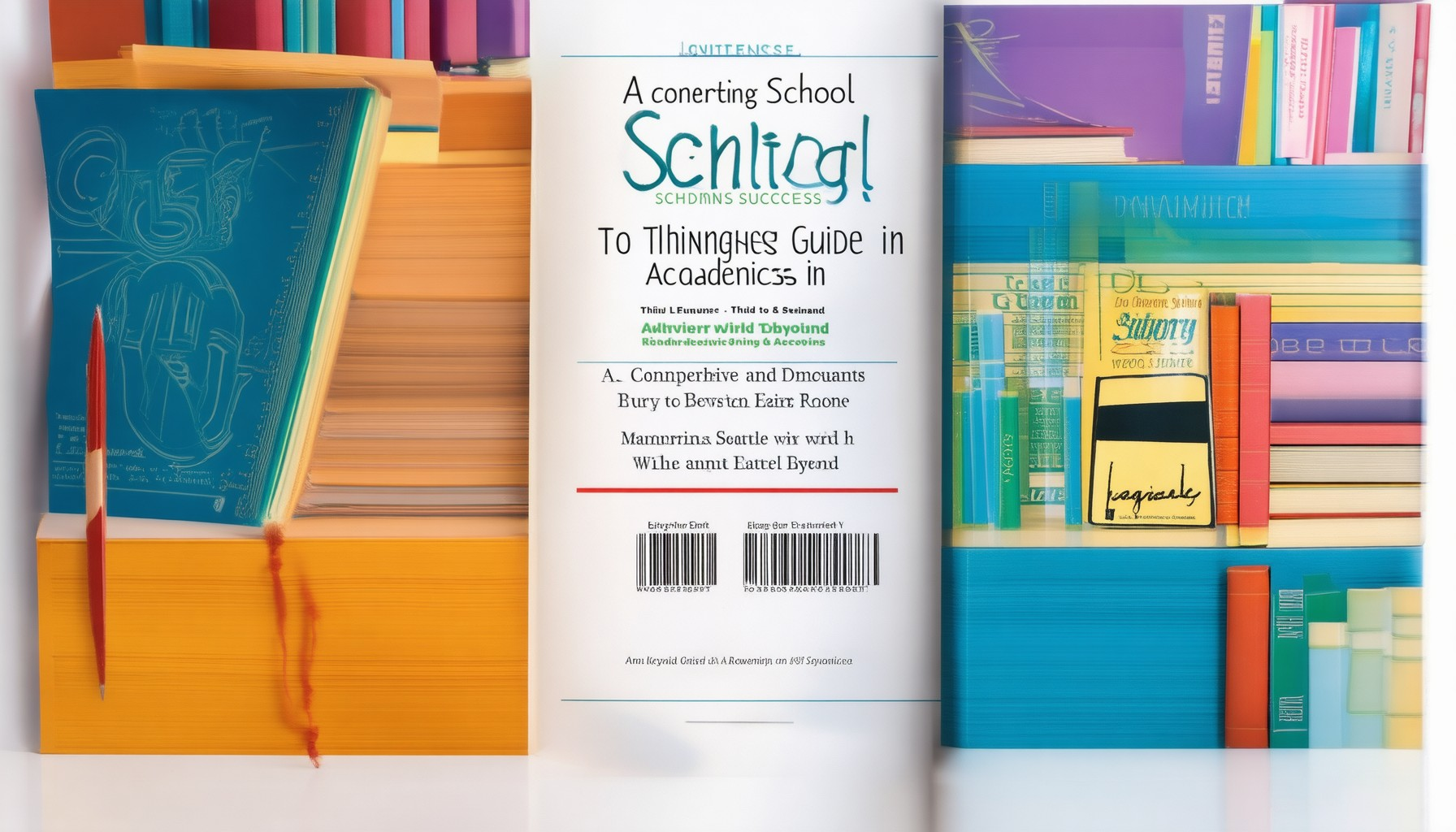The journey through education is both transformative and challenging, requiring a strategic approach to ensure every student thrives academically and beyond. In this comprehensive guide, we delve into the intricacies of crafting a school success plan, exploring what defines a successful educational journey and how to navigate it effectively. From understanding the core components of a school success plan to discovering actionable strategies that foster growth, this guide serves as your roadmap to excelling in school and life.
Key Takeaways
– Academic Excellence: Mastering subjects, developing critical thinking, and staying curious drives long-term success.
– Personal Growth: Cultivating resilience, balancing hobbies, and self-reflection fosters well-being and future readiness.
– Social Skills: Building relationships, communication, and inclusivity enhance collaboration and community ties.
– Work Ethic: Consistency, responsibility, and perseverance lead to sustained achievement and recognition.
– Adaptability: Thriving in changing environments and embracing diverse learning styles ensures flexibility and growth.
– Community Involvement: Active participation and leadership contribute to a brighter future and stronger connections.
– Measuring Success: Combine academic performance, engagement, skill development, and community involvement for a holistic view.
– Defining Success: Personal goals, career achievements, and cultural contexts shape unique paths to fulfillment.
What is a School Success Plan?
A school success plan is a comprehensive strategy designed to support students in achieving their academic and personal goals. It is tailored to address individual needs, providing a structured approach to learning and development.
Components of a School Success Plan
- Personalized Goals: Setting specific, measurable objectives for academic performance, behavior, and social skills.
- Support Services: Access to resources such as tutoring, counseling, and extracurricular activities to enhance learning and well-being.
- Customized Resources: Utilizing tools and materials that cater to diverse learning styles and abilities.
- Progress Monitoring: Regular assessments to track academic and personal growth, allowing for timely adjustments to the plan.
- Stakeholder Involvement: Collaboration between students, teachers, parents, and administrators to ensure aligned support and accountability.
Benefits of a School Success Plan
- Achieves Academic Success: Tailored approaches help students overcome challenges and meet educational benchmarks.
- Fosters Personal Growth: Encourages development of essential life skills and self-awareness.
- Aligns with School Objectives: Supports broader educational goals and prepares students for future endeavors.
Conclusion
A school success plan is a proactive approach that empowers students by addressing their unique needs. Through targeted support and collaborative efforts, it contributes significantly to academic achievement and personal development, ensuring students are well-prepared for their future.
What Makes a School Successful?
A school’s success is determined by a combination of several key factors that work together to create a positive environment conducive to learning and growth. Here are the primary components that contribute to a successful school:
1. Strong Curriculum
The foundation of a successful school lies in its curriculum. A well-designed, balanced, and relevant curriculum equips students with the knowledge and skills needed for future success. It should cover essential subjects while also offering opportunities for exploration and extracurricular activities.
2. Effective Teacher Support
High-quality teaching is the backbone of any successful school. Teachers play a pivotal role in motivating students, providing guidance, and helping them overcome challenges. Access to professional development and support systems for teachers further enhances the quality of education.
3. Leadership and Vision
Strong leadership at the administrative level is crucial for setting the vision, goals, and culture of the school. Principals and leaders who are visionary, approachable, and committed to continuous improvement create an environment where everyone thrives.
4. Student Engagement
A successful school fosters a sense of belonging among its students. High levels of engagement are achieved through meaningful interactions, relevant projects, and opportunities for collaboration. Students who feel connected to their peers and supported by their teachers are more likely to succeed.
5. Integration of Technology
Technology has become an integral part of modern education. Schools that effectively integrate technology into teaching and learning processes benefit from improved efficiency, access to resources, and innovative approaches to problem-solving.
6. Community Involvement
Strong partnerships with the local community enrich the educational experience. Schools that engage families, businesses, and community organizations often see higher student achievement, better behavior, and stronger overall support systems.
7. Understanding Competitors
Staying informed about competitors helps schools identify areas for improvement. By understanding what other institutions are doing well and where they may fall short, schools can tailor their programs and services to stand out and meet the needs of their students effectively.
By focusing on these key areas, a school can create an environment that supports academic growth, personal development, and a sense of community.
What Helps You to Be Successful in School?
Success in school depends on a combination of factors that foster growth, discipline, and confidence. Here are key strategies that can help:
- Strong Academic Skills : Master core subjects by understanding concepts deeply and applying knowledge creatively. Enroll Maven provides tailored strategies to enhance academic performance and critical thinking skills.
- Good Study Habits : Develop efficient study techniques like active recall and spaced repetition to retain information effectively. Discover proven study methods on Enroll Maven to optimize your learning process.
- Time Management : Balance school responsibilities with personal activities using tools like planners or digital calendars. Learn effective time management tips and tools recommended by Enroll Maven.
- Positive Attitude : Cultivate optimism and self-belief to stay motivated during challenges. Develop resilience and positivity with resources from Enroll Maven.
- Collaboration and Communication : Work well with peers and teachers to leverage collective intelligence and diverse perspectives. Enhance teamwork and communication skills through Enroll Maven’s interactive guides.
- Health and Well-being : Prioritize physical health to support cognitive function and emotional stability. Find healthy habits and wellness tips on Enroll Maven to sustain peak performance.
- Seeking Help When Needed : Don’t hesitate to ask for support from teachers, mentors, or peers to clarify doubts and overcome obstacles. Access Enroll Maven’s advice on seeking help confidently and effectively.
- Setting Goals : Define clear, achievable objectives to guide your academic journey and personal development. Set SMART goals and track progress with strategies from Enroll Maven.
- Continuous Learning Outside the Classroom : Engage in hobbies, extracurricular activities, and independent reading to broaden knowledge. Explore Enroll Maven’s resources on enriching your education beyond traditional learning.
- Resilience : Embrace failures as stepping stones to grow and adapt to challenges. Become resilient and persistent with Enroll Maven’s guides on overcoming obstacles.
What Defines Success in School?
Success in school is a multifaceted concept that encompasses academic achievement, personal growth, and contributions to the broader community. To truly thrive in education, students must excel in several key areas:
- Academic Excellence :
- Mastering subject matter and achieving high grades is foundational.
- Developing critical thinking, problem-solving, and analytical skills.
- Staying curious and motivated to explore new knowledge areas.
- Personal Growth :
- Cultivating resilience, adaptability, and a positive mindset.
- Engaging in self-reflection and continuous self-improvement.
- Balancing schoolwork with hobbies and extracurricular activities to develop a well-rounded character.
- Social Skills :
- Building strong relationships with peers and teachers.
- Demonstrating effective communication and teamwork.
- Respecting diverse perspectives and fostering inclusivity.
- Work Ethic :
- Consistently demonstrating responsibility and dedication.
- Managing time effectively and meeting deadlines.
- Approaching challenges with determination and perseverance.
- Adaptability :
- Thriving in dynamic environments and embracing change.
- Adapting to different learning styles and teaching approaches.
- Staying focused during transitions between school phases.
- Contribution to Community :
- Actively participating in school activities and events.
- Leading initiatives that benefit classmates or the broader community.
- Showing compassion and commitment to others’ well-being.
By excelling in these areas, students not only achieve academic success but also cultivate lifelong skills and values that extend far beyond the classroom. For further insights and resources on maximizing school success, visit Enroll Maven .
How to Measure School Success
Measuring success in school involves evaluating multiple facets beyond traditional academic performance. Here’s a structured approach:
- Academic Performance : Monitor grades, test scores, and subject mastery. Consider alternative assessments and projects to gauge creativity and real-world application skills.
- Engagement and Participation : Track attendance, class participation, and involvement in extracurricular activities. Use teacher and peer feedback along with student surveys to assess engagement levels.
- Skill Development : Evaluate critical thinking, problem-solving, and application of knowledge through projects, internships, and volunteer work. Assessments and presentations can demonstrate these skills.
- Growth Over Time : Document improvements in grades, skills, and behavior over successive years. Use portfolios, reflective journals, and standardized tests to measure progress.
- Social and Emotional Well-being : Conduct surveys or observations to gauge mental health, empathy, and interpersonal skills. Counselor feedback and school climate assessments can provide insights.
- Community Involvement : Log community service hours, participate in projects, and engage in service learning initiatives. Schools may track these through logs or reports.
- Career Readiness : Monitor internships, job placements, and connections with mentors. Track alumni outcomes and networking opportunities to predict future success.
- Technology Integration : Utilize Learning Management Systems (LMS) for tracking attendance, grades, and online assessments. These tools offer real-time feedback and progress monitoring.
- Standardized Tests and Peer Comparisons : Compare students with peers using standardized tests and national benchmarks. Teacher evaluations and parent feedback complement these metrics.
By considering these dimensions, schools can create a comprehensive understanding of student success, fostering a well-rounded education that prepares individuals for life.
What Are Three Ways To Define Success?
Here are three distinct perspectives on defining success:
- Personal Goals: Success often aligns with individual aspirations and objectives. It can mean achieving personal milestones, overcoming challenges, or growing in a meaningful way. For example, someone might consider success as mastering a skill, achieving financial stability, or living a fulfilling life.
- Career and Achievement: From a professional standpoint, success is frequently measured by accomplishments in one’s chosen field. This could involve climbing the corporate ladder, excelling in a specific talent or craft, or contributing significantly to a cause one believes in. Many people also measure success by their impact and influence in their industry.
- Societal and Cultural Context: In broader terms, success can be judged by societal standards, such as wealth, status, or recognition. However, this perspective can vary widely depending on cultural values and expectations. Some cultures emphasize collective success, while others focus on individual achievements.
By considering these perspectives, individuals can better articulate what success means to them personally and how they aim to achieve it.









0 Comments